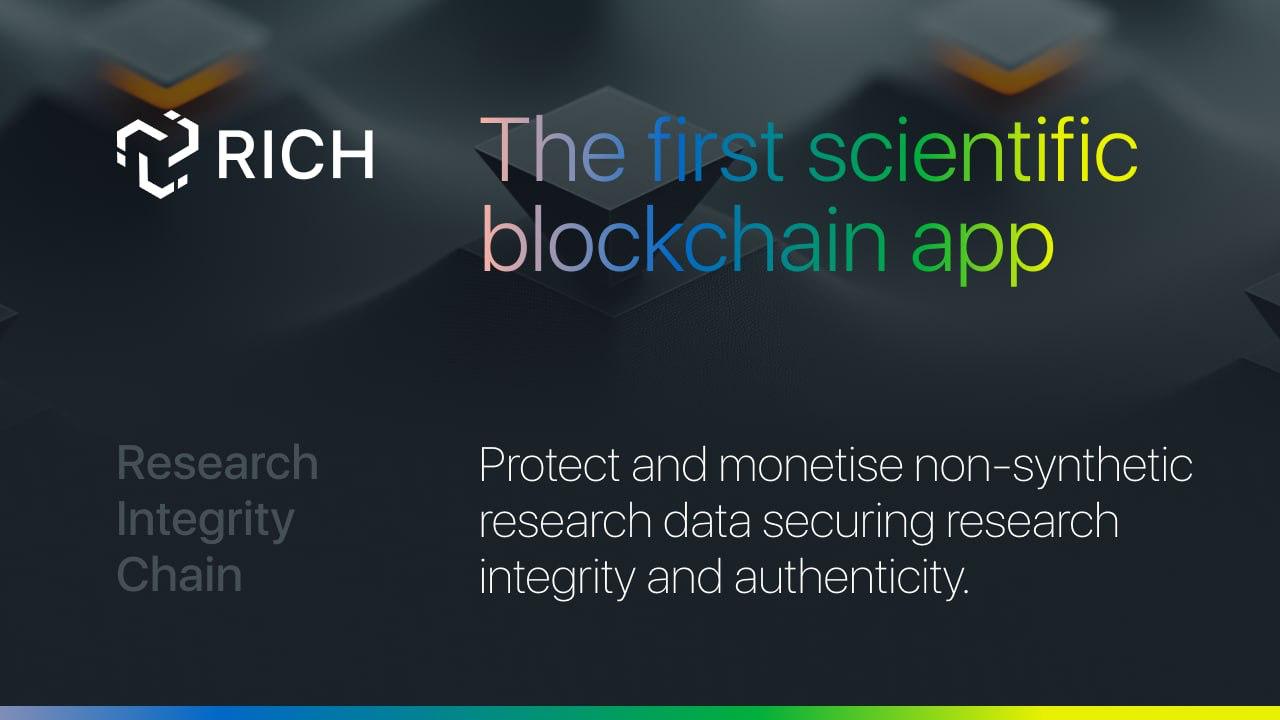London-based startup launches first-of-its-kind solution to protect intellectual property in academia and business.
LONDON, GB / ACCESS Newswire / February 19, 2025 / In an era where most research misconduct cases remain unresolved (year after year), a London-based deep tech startup is launching an innovative solution to protect scholarly and any other research work. Research Integrity Chain (RICH) debuts as the first scientific blockchain application designed to safeguard and monetize research intellectual property, addressing a critical gap in academic integrity.

Recent data from the National Science Foundation's Office of Inspector General and Office of Research Integrity shows that between 2020 and 2024, research misconduct charges averaged 280 cases per year. Of these, an average of about 87 cases were closed each year.
An analysis by Arthur M. Michalek has estimated that the typical cost of an investigation for an institution is $525,000. Extrapolating this amount as an average for the 433 investigations reported as closed to ORI and NSF over the past five years would mean that institutions spend an average of about $45 million annually on research misconduct.
If we try to estimate the total losses in all areas, the figures speak for themselves. According to our estimates based on NSF and other sources the total US research market misconduct can reach $29.0 billion in 2025, including losses from fabrication, plagiarism, data manipulation, etc. which is about 3% of direct and 7% of indirect losses out of the total $1 trillion market.
Dmytro Shestakov, CEO and co-founder of RICH, says "We have a clear answer to this challenge. We prevent forgery and ensure integrity of researchers' IP rights for every single piece of data they work with". "The data is further tokenized and can be proved by immutable, traceable and verifiable research records."
"Think of it as a researcher's tool where everyone can view what's written, but no one can remove or change earlier entries without everyone knowing or agreeing on," adds Dr. Balaji Panchapakesan, Fulbright Research Scholar, Harvard Business Review Advisory Council, Sloan Fellow in Leadership and Strategy at London Business School, Faculty Research Achievement Award winner at Worcester Polytechnic Institute, Advising and Mentoring Award winner at University of Louisville, and National Science Foundation CAREER Award winner.
The next iteration of the RICH application will integrate seamlessly into existing workflows. "We have launched and right now providing research copyright protection to individual researchers and research teams" Dmytro emphasizes. "In another word, we offer an additional layer of security without disrupting established processes for the price of 2 cups of coffee and that's just the beginning".
RICH's technical advantage lies in its application of blockchain technology to create what is essentially an immutable digital ledger for research. The platform tokenizes research data and creates verifiable timestamps for each step of the research process, from initial hypothesis to final publication. Their answer attends to four important research community needs:
1. Protecting unpublished intellectual property
2. Secure data authenticity verification
3. Safe collaboration in research
4. Prospect for research monetization
The timing couldn't be more crucial. Against the backdrop of problems associated with research misconduct, there is a growing problem with the untraceable use of AI in critical areas of our life such as medicine, politics, elections, etc. While the unchecked use of AI in medicine is a huge problem of unknown magnitude whose consequences we have yet to explore, the processes involved in the cognitive-behavioural manipulation of people using major internet platforms and social media are already having obvious disastrous consequences.
In a recent letter, European affairs ministers want the European Commission to use its powers under the Digital Services Act to protect the integrity of European elections from foreign interference and manipulation of information. In their pledge, they cite growing threats of destructive foreign interference in elections by Russia and China, which threaten their stability and sovereignty.
The described phenomena need to be regulated by the EU AI Act: first regulation on artificial intelligence, The Digital Services Act and Digital Markets Act and should formally ensure transparency and traceability of the described processes.
The RICH provides a relevant but technical ready-to-use solution for academic and any other institutions struggling with research integrity problems. The platform tackles the "perimeter problem" - the difficulty of safeguarding research at the pre-publication stage when information must be distributed but its usage cannot be regulated. What's more, RICH gives to their users the necessary transparency at every stage with the ability to trace the lifecycle of content from its creation to official release, protecting intellectual property rights.
"RICH enables something previously impossible in academia - proving research authenticity and ownership in real-time," said Balaji. "This could fundamentally change how researchers protect their work."
With research showing that questionable research practices affect between 10% and 50% of researchers, RICH's launch marks a significant step forward in protecting scholarly integrity in the digital age.
For a free trial visit: https://researchintegritychain.com/
Media Details:
Company: Research Integrity Chain Ltd (RICH)
Location: London UK
Website URL: https://researchintegritychain.com
SOURCE: Research Integrity Chain Ltd (RICH)
View the original press release on ACCESS Newswire

